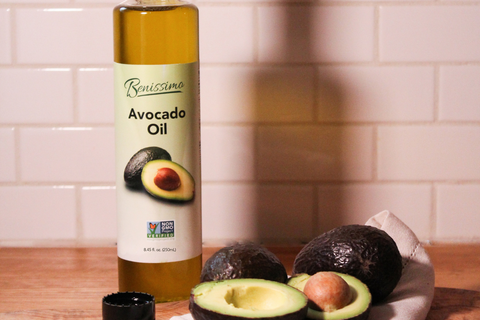It's hard to scroll through social media nowadays without being bombarded with opinions left and right, and the foodie world is no exception to this. You've probably seen both on social media and in the media that seed oils are bad for your health and should be avoided at all costs, but when we tune out the buzz of the media and influencers online, what does the science actually say?
What are seed oils?
Seed oils are extracted from the seeds of plants and are commonly used in cooking due to their affordability, versatility, and mild flavor. The various types of seed oils you most commonly see are cottonseed, soybean, safflower, grapeseed, and rice bran oils to name a few. Seed oils are made by pressing the seeds to draw out the oil, but manufacturers of these oils process them further to both get more oil out of the seeds and also remove components that cause rancidity, splattering, dark colors, or flavors. The result? A neutral tasting cooking oil that's shelf stable and can be used at a high heat without smoking and compromising flavors.
What are the common myths and misconceptions about seed oils?
There are a variety of claims about seed oils floating out in the foodie-verse, but the main ones are that these oils are "toxic," that they are driving up rates of diabetes and obesity, and that they cause inflammation and other chronic diseases. These concerns are often given a spotlight on various platforms, namely media channels and social media platforms.
In January of 2025, the New York Times published an article that addresses these concerns and, for lack of a better word, debunks the myths about seed oils with scientific research. In this article, author Alice Callahan quotes Professor Christopher Gardner from Stanford University by calling out that "decades of research have shown that consuming seed oils is associated with better health" and that "to suggest otherwise 'just undermines the science.'"
The Food Business News also published an article in March of 2025 titled "The Heat is on Seed Oils" and, similar to the New York Times article, questions where these myths and misconceptions are coming from while providing science-backed truths about these "infamous" seed oils.
What does science say about seed oils?
"The Heat is on Seed Oils" article from Food Business News quotes Kristina Peterson, an associate professor of nutritional sciences at Penn State, and mentions that "there is a lot of misinformation on the internet about seed oils, which is based in part on a misunderstanding of the metabolism of the fatty acids found in seed oils" and "the inflammation claim is based upon a simplified understanding of the metabolism of linoleic acid in humans."
Omega-6 fatty acids like linoleic acid (found in seed oils) do not inherently cause inflammation. Balance between omega-6 and omega-3 fatty acids is important, but eliminating omega-6 is unnecessary and unsupported by scientific evidence. On the contrary, our bodies convert some omega-6 fatty acids into anti-inflammatory compounds and some researchers concluded that those who consume more omega-6 fatty acids are healthier than those who don't.
There are also clinical trials outlined in the New York Times article mentioned above that suggest when consumers replace saturated fats (such as butter or lard) with seed and plant-based oils, their bad cholesterol levels and risk of heart disease actually decrease.
Where does the misinformation about seed oils come from?
In the food health world, all eyes are on processed foods and the long term affects they've been having on our health over the last few decades. Because of their nature (being high heat, versatile, and flavor neutral), seed oils are often found in processed foods and used in fried foods. But, as it states in the New York Times article, "correlation does not equal causation."
Processed and fried foods are making up much more of our diets in recent decades than they have in the past. We know that these foods are not optimal for health, but there is also no evidence or research that it's the seed oils in these foods that are the culprit. On the contrary, when we use them to cook and prepare "whole" or natural foods, they provide a multitude of benefits to our health.
There's also a little bit of fear-mongering that happens in the media. While it's true that some seed oils are extracted using solvents like hexane, the final product is rigorously purified and deemed safe by regulatory bodies like the FDA and EFSA. But the chemical-sounding process creates fear.
What types of cooking oils are best for me and my household?
The question of whether one cooking oil is better to use than another is not a question of what's right or wrong to use. It often depends on application, taste preferences, or even household budget. If you want a strong, savory flavor in your oil, then Extra Virgin Olive Oil is a great oil for low heat cooking and serving. If you're looking for a neutral tasting oil for baking or high heat applications like grilling or frying, then Canola Oil or Avocado Oil is the better choice. Each type of cooking oil has its place in the kitchen along with its own benefits.
At Benissimo, we love to celebrate the benefits of all types of cooking oils and also strive to create products that are both healthy and accessible to all households. Our collection of cooking oils reflects out heart behind good food and bringing people together, and you'll find everything from our Herb-Infused Oil Blends, Organic Avocado Oil, Extra Virgin Olive Oil, Toasted Sesame Seed Oil, and so much more.

